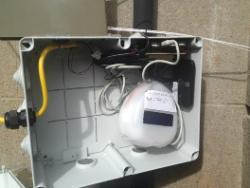Completed Citizen Science Projects
NUI Galway / EPA Air Quality Monitoring
EPA SAFECAST Radiation Monitoring
Trinity College Dublin / Irish Times
EPA Radon Measurement in Homes
European Environment Agency Clean Air @ School

|
This project engaged transition year students from four schools in Dublin and Galway to monitor air quality in their environment. This was a collaborative project between the schools, the EPA and the Centre for Climate and Air Pollution Studies (NUIG). The pilot study included the provision of a system of sensors to measure particulate matter, ozone, temperature and relative humidity. These sensors were calibrated and characterized for use by NUIG. The data were collated and imported to a website by the students and then evaluated with the support of a facilitator from NUIG. The study enabled the students to learn more about air quality both in their locality and nationally. |

|
The EPA participated in an international citizen science project to map ambient radioactivity levels: Safecast This project evolved in the aftermath of the Fukushima nuclear accident in Japan in 2011. Citizen scientists purchase and build a GPS enabled radiation monitor that can be used by anyone. This monitor is relatively inexpensive, easy to build and its performance has been tested in the EPA radiation calibration facility. This testing showed that the monitor is both reliable and accurate. The monitor allows users to take radiation measurements and GPS co-ordinates and the data is then openly shared on the Safecast website. The EPA used this monitor to map external radiation levels throughout Ireland. All measurements showed normal background levels of radiation at all locations. The EPA project is complete, but the international project continues to grow. |

|
Trinity College Dublin worked with the Irish Times to carry out research through citizen science. Research has been carried out on |

|
The EPA carried out a survey in which a sample of householders were asked to test their home for radon and complete a questionnaire. The questionnaire sought data relating to the house type, age and insulation. This data has helped us better understand the behaviour of radon in different types and ages of homes, helping us to improve the advice we can give to homeowners about protecting themselves from this radioactive gas. |

|
RECONNECT was an EPA funded research project carried out by University College Dublin, with the aim of assessing the extent and impact of flow barriers or obstacles on freshwater biology, hydromorphology and connectivity in Ireland. Citizen scientists used an app to take a photograph of an obstacle and note some details. The location of the obstacle was then mapped via the GPS facility in the smartphone (a link to the River Obstacles App can be found here). The information collected was used to help build a georeferenced data layer of river obstacles in Ireland and many other uses into the future. Ultimately, the data collected will be used to map barriers for their modification or where appropriate, their removal. |

|
To raise awareness and inform citizens of air quality issues, Environmental Protection Agencies across Europe engaged pupils, teachers, and parents in implementing the CleanAir@School project. Using simple low-cost devices, students from participating schools measured levels of the traffic pollutant, nitrogen dioxide, around their schools. Now the campaigns are completed and eight Agencies tell their individual CleanAir@School story. |